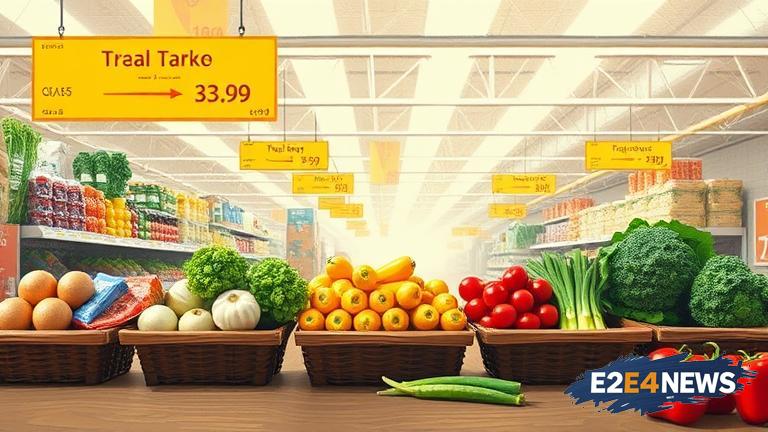The current trade tensions between major economies are causing a significant impact on the global food market. As tariffs are imposed on various food products, consumers are likely to face higher prices, which could lead to decreased purchasing power and altered eating habits. The effects of these tariffs are already being felt, with prices of staple foods such as meat, dairy, and produce increasing. The tariffs are not only affecting the prices of imported goods but also having a ripple effect on the domestic market. Farmers and producers are facing increased costs, which are being passed on to consumers. The trade wars are also disrupting global supply chains, leading to shortages and delays in the delivery of food products. The World Trade Organization (WTO) has warned that the ongoing trade tensions could lead to a decline in global trade, which would have far-reaching consequences for the food industry. The tariffs are also affecting the livelihoods of farmers and producers, who are struggling to stay afloat due to the increased costs and decreased demand. The impact of the tariffs is being felt across the globe, with countries such as China, Mexico, and Canada being affected. The US-China trade war, in particular, has led to a significant increase in tariffs on food products, including soybeans, pork, and chicken. The tariffs have also led to a decline in US agricultural exports, which has had a devastating impact on the farming community. The trade wars are also having a political impact, with many countries retaliating against the US with their own tariffs. The EU, for example, has imposed tariffs on US goods such as whiskey and motorcycles. The trade tensions are also affecting the global economy, with the International Monetary Fund (IMF) warning that the trade wars could lead to a decline in global economic growth. The impact of the tariffs on food prices is also being felt by low-income households, who are struggling to make ends meet. The increased prices are leading to decreased food security, with many households being forced to alter their diets or rely on food banks. The trade wars are also having an environmental impact, with the increased costs and decreased demand leading to increased food waste. The food industry is also facing increased costs due to the tariffs, which are being passed on to consumers. The tariffs are also affecting the competitiveness of the US food industry, with many companies struggling to stay competitive in the global market. The trade wars are a complex issue, with many factors at play, but one thing is clear: the tariffs are having a significant impact on the global food market and consumers are bearing the brunt. The US government has announced plans to provide aid to farmers affected by the tariffs, but many are questioning whether this will be enough to mitigate the effects. The trade wars are also leading to increased tensions between countries, with many calling for a resolution to the trade disputes. The impact of the tariffs on food prices is likely to be felt for a long time, with many experts warning that the effects could be long-lasting. The trade wars are a wake-up call for the global food industry, highlighting the need for increased cooperation and trade agreements to ensure food security and stability.
